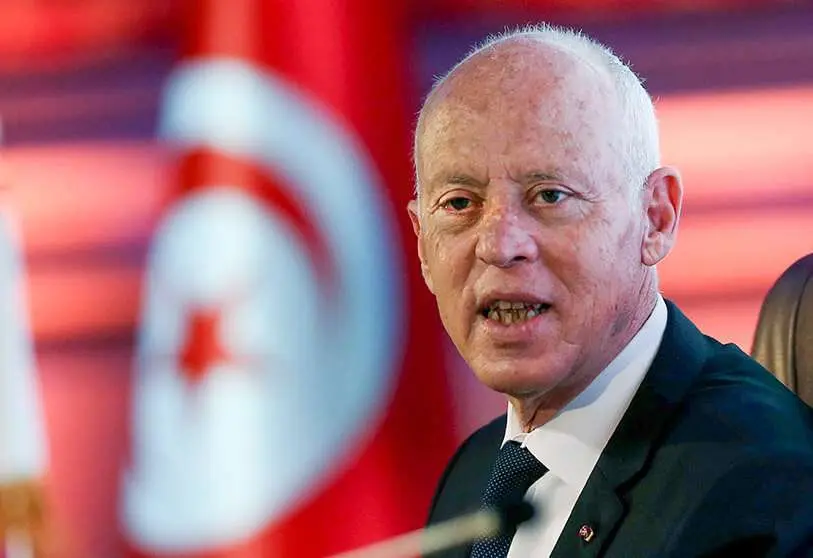Secret document leaked that would give Tunisian president expanded powers

As the standoff between Tunisian President Kaïs Saied, Prime Minister Hichem Mechichi and Islamist Ennahda party leader Rached Ghannouchi continues, the Middle East Eye published a five-page document, dated 13 May and marked 'top secret', urging Tunisia's president to promulgate Article 80 of the Constitution that allows him to establish a state of emergency by granting him broad powers.
This document, leaked by a presidential source, came from the office of the president's chief of staff, Nadia Akacha, to promulgate Article 80 in the Constitution, which - in the event of a national emergency - under the cover of the health situation and the accumulation of public debt, would give total control of the state to the current president, Kais Saied. The document also contains a "plan" that states that "in such a situation, it is the function of the President of the Republic to gather all powers in his hands so that he becomes the centre of authority that will allow him to control exclusively... all the authorities that grant him this power.

Kais Saied, would then declare a "constitutional dictatorship" which, according to the authors of the document, is a tool to concentrate all powers in the hands of the president of the Republic to ambush Hichem Mechichi, prime minister, and Rached Ghannouchi, speaker of parliament and leader of the Ennahda party, by announcing in their presence the promulgation of Article 80 of the Constitution. At that point, the president would address the nation in a televised speech in the presence of the prime minister and the speaker of parliament to announce his coup d'état.
To popularise the coup, the document states that payment of electricity, water, telephone and internet bills would be suspended for 30 days, as well as repayment of bank loans and tax payments, and that the price of basic commodities and fuel would be reduced by 20 per cent.

The plan also includes proposals to ban the departure from the country of any parliamentarian wanted by the Tunisian judiciary, and to remove from office all rulers affiliated to a political party. The problem is that this article cannot be implemented without a Constitutional Court, which does not yet exist, blocked by Kais Saied among others.
The document could not be authenticated, but Kais Saied's supporters have directly accused Ennahda of having created this document from scratch in order to tarnish the image of the presidency and give credence to the idea of an authoritarian temptation. Furthermore, the "dangerous proposals" contained in the plan call for a "serious and swift investigation to reveal all the circumstances and reassure public opinion", Ennahda said in a statement.

Ennahda has formed a coalition government allied with the Islamo-nationalist Al-Karama movement, and media mogul Nabil Karoui's Qalb Tounes party. That coalition has been at loggerheads for months with Saied, elected after the October 2019 legislative elections that resulted in a parliament fragmented into a dozen parties and 20 or so independents. The Islamist party Ennahda, which has 52 of the 217 seats in parliament, has been a key player in the negotiations to form a government - the third in just over a year - and has become the main supporter of Hichem Mechichi's executive.
On 26 January, the head of government, Hichem Mechichi, obtained a broad parliamentary majority to change eleven of the 25 portfolios - including the interior, justice and health - but the president of the Republic, Kais Saied, rejects it on the grounds that he was not consulted beforehand and that five of the new ministers are implicated in cases of corruption and conflict of interest.

Alternatives have already emerged within parliament should de Saied maintain his position. Some MPs have launched the formula of a motion of censure against the president, which is enshrined in Article 88 of the Constitution. This states that "the members of the Assembly of People's Representatives may, by majority vote, submit a reasoned motion to terminate the mandate of the President of the Republic for a serious violation of the Constitution". The motion of censure must be approved by two-thirds of the Assembly. If it receives parliamentary approval, the process would then pass to the Constitutional Court, which also decides by a two-thirds majority. However, in case of approval, the Constitutional Court itself can only pronounce the dismissal of the criminal proceedings without prejudice to Saied.

The political paralysis comes at a time when the COVID-19 crisis is weakening an already battered economy that contracted by more than 8 per cent last year, and when foreign lenders and Tunisia's powerful trade unions are demanding that reforms be accelerated, while many Tunisians are increasingly jaded by the government's handling of poor public services and a political class that has repeatedly demonstrated its inability to govern coherently. This decision would deprive the president of the republic of the right to stand as a candidate in any further elections.










